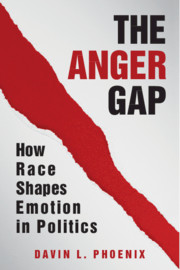Book contents
- The Anger Gap
- The Anger Gap
- Copyright page
- Dedication
- Contents
- Figures
- Tables
- Preface
- 1 Anger in Black and White
- 2 Anger (Mis)Management?
- 3 The Anger Gap and Turnout in American Politics
- 4 From Black Anger to Black Activism
- 5 The Racial Enthusiasm Advantage in Politics
- 6 The Anger Gap, beyond Black and White
- 7 On Dreams Deferred and Anger Inhibited
- Bibliography
- Index
4 - From Black Anger to Black Activism
Published online by Cambridge University Press: 30 October 2019
- The Anger Gap
- The Anger Gap
- Copyright page
- Dedication
- Contents
- Figures
- Tables
- Preface
- 1 Anger in Black and White
- 2 Anger (Mis)Management?
- 3 The Anger Gap and Turnout in American Politics
- 4 From Black Anger to Black Activism
- 5 The Racial Enthusiasm Advantage in Politics
- 6 The Anger Gap, beyond Black and White
- 7 On Dreams Deferred and Anger Inhibited
- Bibliography
- Index
Summary
Chapter Four grapples directly with how seeing red over politics differs for the political participation of blacks and whites. From examinations of black discourses debating the proper role of anger in black political strategizing emerge a picture of black anger that directs individuals more toward oppositional actions such as protesting and boycotting rather than electoral actions like voting. Data from both a national survey and the 2018 RAP study show that anger over politics and racial issues more effectively steers African Americans to activist activities than vote-related activities. These data also show how the relationship between black people’s anger and their participation in such activities is shaped by their views on race and their collective agency within politics. African Americans’ senses of racial linked fate with other groups, their desire to stay calm in the face of discrimination, and their perceptions of the stress caused by race all inhibit the capacity of anger to translate to actions to address the issue of race and policing.
- Type
- Chapter
- Information
- The Anger GapHow Race Shapes Emotion in Politics, pp. 110 - 152Publisher: Cambridge University PressPrint publication year: 2019

